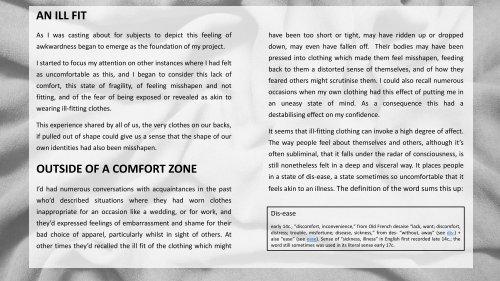take clothes for instance BOOK
Create successful ePaper yourself
Turn your PDF publications into a flip-book with our unique Google optimized e-Paper software.
AN ILL FIT<br />
As I was casting about <strong>for</strong> subjects to depict this feeling of<br />
awkwardness began to emerge as the foundation of my project.<br />
I started to focus my attention on other <strong>instance</strong>s where I had felt<br />
as uncom<strong>for</strong>table as this, and I began to consider this lack of<br />
com<strong>for</strong>t, this state of fragility, of feeling misshapen and not<br />
fitting, and of the fear of being exposed or revealed as akin to<br />
wearing ill-fitting <strong>clothes</strong>.<br />
This experience shared by all of us, the very <strong>clothes</strong> on our backs,<br />
if pulled out of shape could give us a sense that the shape of our<br />
own identities had also been misshapen.<br />
OUTSIDE OF A COMFORT ZONE<br />
I’d had numerous conversations with acquaintances in the past<br />
who’d described situations where they had worn <strong>clothes</strong><br />
inappropriate <strong>for</strong> an occasion like a wedding, or <strong>for</strong> work, and<br />
they’d expressed feelings of embarrassment and shame <strong>for</strong> their<br />
bad choice of apparel, particularly whilst in sight of others. At<br />
other times they’d recalled the ill fit of the clothing which might<br />
have been too short or tight, may have ridden up or dropped<br />
down, may even have fallen off. Their bodies may have been<br />
pressed into clothing which made them feel misshapen, feeding<br />
back to them a distorted sense of themselves, and of how they<br />
feared others might scrutinise them. I could also recall numerous<br />
occasions when my own clothing had this effect of putting me in<br />
an uneasy state of mind. As a consequence this had a<br />
destabilising effect on my confidence.<br />
It seems that ill-fitting clothing can invoke a high degree of affect.<br />
The way people feel about themselves and others, although it’s<br />
often subliminal, that it falls under the radar of consciousness, is<br />
still nonetheless felt in a deep and visceral way. It places people<br />
in a state of dis-ease, a state sometimes so uncom<strong>for</strong>table that it<br />
feels akin to an illness. The definition of the word sums this up:<br />
Dis-ease<br />
early 14c., “discom<strong>for</strong>t, inconvenience,” from Old French desaise “lack, want; discom<strong>for</strong>t,<br />
distress; trouble, mis<strong>for</strong>tune; disease, sickness,” from des- “without, away” (see dis-) +<br />
aise “ease” (see ease). Sense of “sickness, illness” in English first recorded late 14c.; the<br />
word still sometimes was used in its literal sense early 17c.


